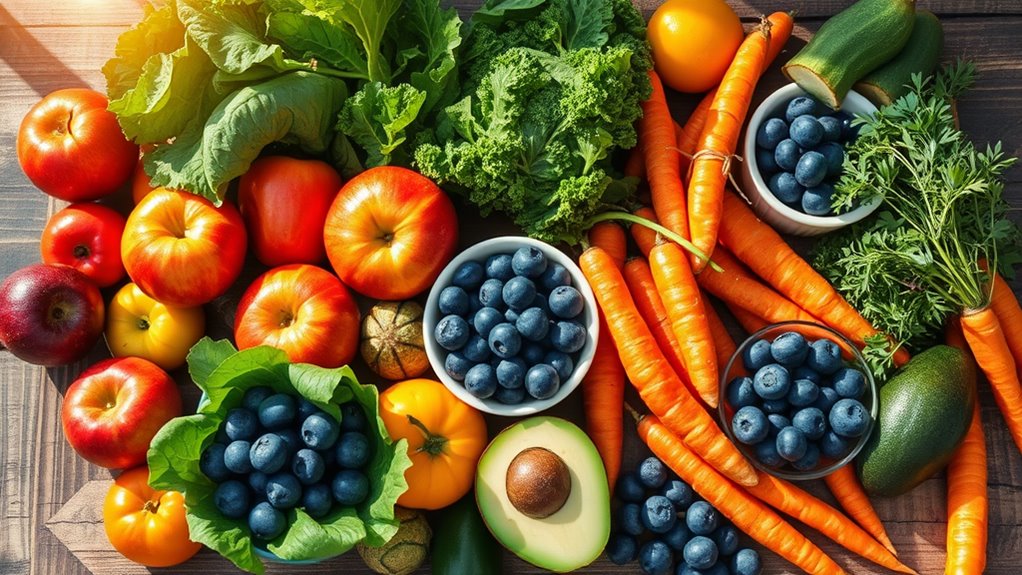These Natural Foods Might Be Better Than Supplements
Imagine a vibrant garden brimming with leafy greens and colorful berries, each plant a testament to nature’s wisdom. These natural foods often offer more than supplements can, providing essential nutrients in a form your body readily absorbs. Whole grains and fermented foods contribute to gut health and reduced inflammation, while healthy fats from avocados and nuts support overall well-being. But how do these foods stack up against isolated vitamins and minerals?
Key Takeaways
- Leafy greens provide a nutrient-dense profile, offering vitamins and minerals that enhance health without the additives found in supplements.
- Berries are rich in antioxidants, helping to combat oxidative stress and reduce inflammation more effectively than many synthetic supplements.
- Whole grains supply complex carbohydrates and essential nutrients, promoting energy and digestion while reducing chronic disease risk naturally.
- Fermented foods introduce probiotics for gut health, supporting digestion and immunity, which supplements often fail to replicate fully.
- Healthy fats from avocados and nuts contribute essential nutrients and antioxidants that support heart health and reduce inflammation more holistically than isolated supplements.
The Nutrient Density of Leafy Greens
Leafy greens are among the most nutrient-dense foods you can add to your diet. Packed with vitamins A, C, K, and essential minerals like iron and calcium, they support overall health. By focusing on whole food nutrition, you’re ensuring your body receives these nutrients in their most bioavailable form. Incorporating spinach, kale, or Swiss chard into your meals boosts your fiber intake and helps maintain a healthy digestive system. Plus, these greens are low in calories, making them an excellent choice for weight management. Furthermore, consuming these greens can lead to improved overall health, as they provide a variety of phytonutrients that support bodily functions.
The Power of Berries for Antioxidants
Incorporating a variety of fruits into your diet can significantly enhance your health, and berries are particularly powerful due to their high antioxidant content.
These tiny fruits, like blueberries, strawberries, and raspberries, pack a punch with compounds such as flavonoids and vitamin C, which help combat oxidative stress and reduce inflammation.
Research shows that regularly consuming berries can lower the risk of chronic diseases, including heart disease and diabetes. Additionally, essential superfoods like berries can provide a wide range of nutrients that support overall well-being.
To maximize their benefits, enjoy berries fresh, add them to smoothies, or sprinkle them on yogurt.
Whole Grains: A Source of Complete Nutrition
Whole grains are essential for a balanced diet, offering a wealth of nutrients that support overall health.
They provide complex carbohydrates, fiber, vitamins, and minerals, all crucial for energy and digestion.
Foods like brown rice, quinoa, and whole wheat bread can help reduce the risk of chronic diseases, including heart disease and diabetes.
Incorporating whole grains into your meals can also enhance satiety, helping you manage your weight more effectively.
Aim for at least half your grain intake to come from whole sources. Additionally, a balanced meal composed of whole grains can further improve your nutrient intake and overall well-being.
Fermented Foods and Gut Health
Fermented foods play a crucial role in promoting gut health, thanks to their rich content of probiotics—beneficial bacteria that help maintain a balanced microbiome. Including these foods in your diet can enhance digestion, boost immunity, and improve overall well-being. Research shows that a healthy gut microbiome can also positively impact your mood and cognitive focus, highlighting the importance of the gut-brain connection.
Here are some excellent fermented options to consider:
- Yogurt: A staple source of live cultures
- Kefir: A probiotic-rich drink, great for gut flora
- Sauerkraut: Fermented cabbage packed with vitamins
- Kimchi: Spicy and nutritious, offers beneficial bacteria
- Miso: A versatile fermented paste, great for soups
Adding these foods can significantly benefit your gut health!
Healthy Fats: The Benefits of Avocados and Nuts
When it comes to healthy fats, avocados and nuts stand out as nutrient powerhouses that can boost your overall health.
These foods are rich in monounsaturated fats, which can lower bad cholesterol levels and reduce heart disease risk.
Avocados provide potassium, supporting blood pressure regulation, while nuts offer protein and fiber, promoting satiety.
Incorporating a handful of nuts or half an avocado into your meals can enhance nutrient absorption, especially for fat-soluble vitamins.
Plus, their antioxidants help reduce inflammation. Additionally, both avocados and nuts contain anti-inflammatory properties that can further support your body’s health.


